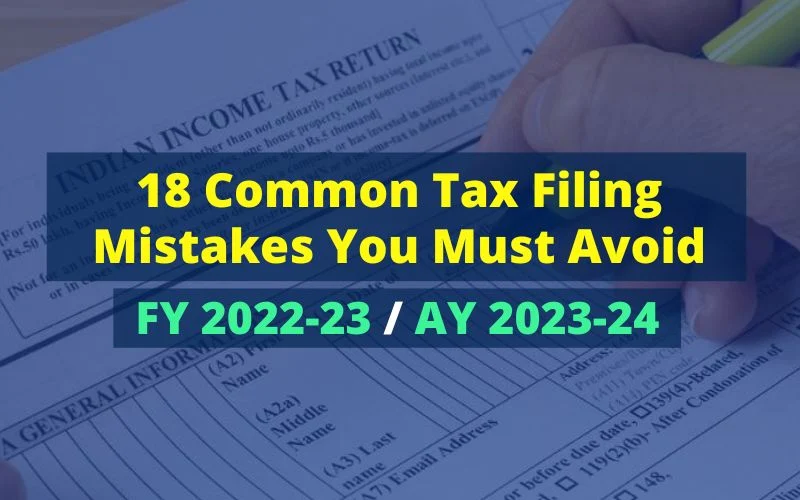Filing income tax returns (ITR) in India can be a complex process, and it’s not uncommon for taxpayers to make mistakes that can lead to penalties or delays in processing. I have written this detailed article to help you understand the common tax filing mistakes that you must avoid so that you can file your ITR correctly to avoid any notice or penalty from the IT department.

18 Common Tax Filing Mistakes
Mistake-1: Incorrect personal information
One of the most common mistakes is providing incorrect personal information such as contact number, email ID, address, and bank details.
- Email ID: Email ID is required to receive ITR-V after you file your income tax return. Also, if you forgot your login password, OTP will come to the registered email.
- Contact Number: Mobile number is required for E-Verification, and Intimation text by ITR. Also, if you forgot your login password, OTP will come to the registered mobile number and email.
- Address: A correct address is required, as the IT department will send any notice to the provided last address. If you have changed your city, use the new address while filing your FY 2022-23 income tax return.
- Bank details: A correct and active bank detail is necessary to receive a speedy refund from the IT Department.
It’s crucial to double-check all personal information before submitting the ITR to avoid any discrepancies.
Mistake-2: Opting for the wrong Assessment Year
While filing the returns, one must ensure to choose the correct AY. For FY 2022-23, the correct AY is 2023-24. Mentioning the wrong AY increases the chances of double taxation and attracts unnecessary penalties.
Mistake-3: Choosing the wrong ITR form
There are seven ITR forms, i.e., ITR-1, ITR-2, ITR-3, ITR-4, ITR-5, ITR-6 & ITR-7 based on the source and amount of income. Choosing the wrong form can lead to the rejection of the ITR.
Ensure you select the correct form matching your income sources and category.
Mistake-4: Not reporting interest income from savings bank accounts, Fixed deposits, etc.
Due to a lack of awareness, many taxpayers fail to mention these under the head- Income from other sources in their tax returns. The savings account interest income is taxable when it exceeds Rs.10,000 p.a. While filing your return, make sure to mention interest received from the savings bank under the head Income from other sources, and then you can claim a deduction upto Rs. 10,000 under section 80TTA (if you are below 60).
For senior citizens, a deduction up to Rs. 50,000 is allowed under section 80 TTB from the total interest income earned in a financial year. Please note that FD’s interest is also part of 80TTB.
Mistake-5: Failure to report all sources of income
Many taxpayers fail to report all their sources of income, such as interest income, capital gains, rental income, or income from freelancing or consulting. It’s essential to include all income.
Mistake-6: Inaccurate calculation of Taxable Income
Incorrect calculation of taxable income is a common mistake. Taxpayers often overlook deductions and exemptions available under various sections of the Income Tax Act, leading to an inaccurate assessment of their taxable income. This inaccuracy It’s crucial to thoroughly review the deductions and exemptions and calculate taxable income correctly.
It is essential to consider income tax planning to avoid additional tax payments and calculation mistakes.
Mistake-7: Do not club incomes
According to the Income Tax Act, there are certain instances where the taxpayer must club their spouse’s income (if income earned by the taxpayer is invested in the spouse’s name) or minor child with his income and pay taxes accordingly. A minor is a child below 18 earning an income (for example – FD income) that needs to be clubbed with the parent’s income.
Mistake-8: Not keeping proof of deductions claimed in an income tax return.
For all expenses/ investments claimed as deduction under Chapter VIA (PPF, Life insurance premium, Children’s Tuition fees, Medical insurance policy premium, etc.), maintenance of proofs of such expenses and investments are required. Claiming a deduction without adequate evidence can increase tax liability during scrutiny assessment. So either have a proof for a particular expense/ investment or don’t claim a deduction.
Mistake-9: Not reporting capital gains on switching units of mutual funds.
When you redeem, switch, or set STP to move units automatically from one scheme to another mutual fund, they are considered a sale of units, and capital gain or loss arises by taking these actions.
These transactions are not reflected in the bank statements but are captured in the Capital gain report by each AMC. You can also acquire the capital gain statement from CAMS & Karvy portal.
If you have worked with a financial planning expert who has planned your investment, lumpsum investments are likely planned with STP and switches. It is advisable to report the same in the Income Tax Return.
Mistake-10: Neglecting to report foreign assets and income
Individuals with foreign assets or income must report them in their ITR. Failure to disclose such assets or income can lead to penalties and legal issues. If applicable, comply with the Foreign Assets and Income Reporting requirements.
Mistake-11: Failure to report income from previous employers
If you have changed jobs during the financial year, you must report income from all employers. Often, individuals forget to report income from previous employers, leading to discrepancies in their ITR.
Consolidate income from all employers and include it in the appropriate section of the ITR form.
Mistake-12: Ignoring TDS (Tax Deducted at Source) details
Taxpayers must ensure that the TDS details mentioned in their Form 26AS match the information provided in the ITR.
Neglecting to report or reconcile the TDS details can result in tax notices and additional tax liabilities.
Mistake-13: Omitting bank accounts
Individuals must report all bank accounts they held during the financial year, including dormant accounts. Failure to disclose these accounts can attract penalties. Provide accurate information about all your bank accounts, including those with zero or minimum balances.
Mistake-14: Non-disclosure of exempted Income
- Some sources of income, such as interest from PPF, life insurance maturity value, gift on your marriage, or relatives like mother, father, sisters, or brothers, are tax-exempt. However, taxpayers must still disclose such income in their ITR under the relevant sections. Non-disclosure of exempted Income can raise red flags during tax assessments.
- Dividend income from shares and mutual funds is taxable in the recipient’s hands at the applicable income tax slab rates to the individual. So, the individual should remember to include the dividend income in the ITR.
Mistake-15: Improper documentation
Insufficient or incorrect supporting documentation can lead to the rejection of your ITR.
Ensure you gather all the necessary documents, such as Form 16, bank statements, investment proofs, rent receipts, and any other supporting documents required to claim deductions or exemptions.
Mistake-16: Late filing or missing deadlines
Missing the deadline for filing your ITR or filing it after the due date can result in penalties and interest charges. Stay informed about the deadline for filing ITR and submit it on time.
Mistake-17: Failing to verify the ITR
After filing the ITR online, it’s crucial to verify it using any of the prescribed methods, such as electronic verification code (EVC), Aadhaar OTP, or sending a signed physical copy to the Central Processing Center (CPC). Neglecting to verify the ITR can lead to its invalidation.
Mistake-18: Not Filing A Revised ITR
The IT Department allows taxpayers to rectify the errors in their original returns by submitting a revised ITR. Even if you are careful, tax return filing mistakes such as wrongful deductions or miss of deductions might happen. In such a case, you should file your revised return before the IT department completes its assessment or before the end of the assessment year.
Conclusion
To conclude, while filing ITR in India, it’s crucial to provide accurate information, report all sources of income, claim deductions correctly, and adhere to deadlines.
Double-checking your ITR before submission and seeking professional assistance, if needed, can help minimize errors and ensure a smooth filing process.
Related Income Tax Articles
ITR For Salaried Person: Which ITR Should I File For FY 2022-23 (AY 2023-24)?
Tax Planning For Salaried Employees





